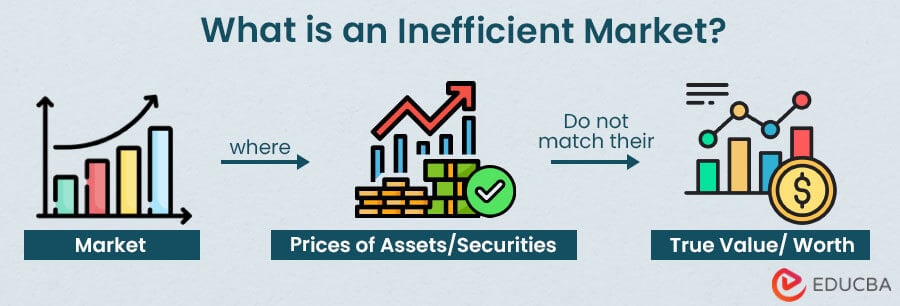Updated August 29, 2023
What is an Inefficient Market?
An inefficient market is where the prices of assets or securities don’t always reflect their actual or real value.
This creates opportunities where you can buy something for less than it’s actually worth or sell it for more than it’s worth because not everyone has the same information at the same time. It’s like a situation where not everyone knows the true value of something, so you can sometimes make good deals.

Table of Contents
Key Highlights
- An inefficient market is when markets can’t achieve the best results or beneficial transactions because they have incomplete information about the asset.
- Inefficiency in the market generally occurs because of a lack of information, monopoly, and other market externalities.
- Investors can gain profit in the market by applying strategies like speculation and arbitrage.
- Some real examples are the Dotcom bubble (1996-2001) and the Great Recession (2007-2009).
Causes
Major causes of inefficient markets are:
- Information Asymmetry: Some market participants may have more information than others, giving them an advantage and creating inefficiency in the market.
- Behavioral Biases: Investors may make trading decisions based on behavioral biases, like fear, greed, or overconfidence, leading to trade inefficiencies.
- Lack of Competition: There might be price manipulation if there is no solid competitive pressure in the market.
- Market Manipulation: Some people may intentionally manipulate prices to their advantage by spreading false information, engaging in deceptive practices, etc.
- Externalities and Public Goods: If many people use or trade a product and it’s profitable, they often don’t pay attention to the negative effects it might have on people, the planet, or the economy.
Examples
Example #1:
Suppose one major pharmaceutical company has the license to sell a specific medicine. In this case, they can use the lack of competition and set the prices to make profits. This is an example of an inefficient healthcare market.
Example #2:
If we consider a few educational sources that are expensive, but their quality of education does not align with the costs they demand. This is an example of an inefficient education market where the price of the service does not match its actual value.
Investing Methods
To trade in an inefficient market, investors need to use the following methods:
- Arbitrage: It is when investors take advantage of price differences for the same asset in different markets. They make profits by buying low in one market and selling high in another.
- Statistical Arbitrage: It is a method where investors exploit differences in asset prices that don’t align with their expected future values, aiming to make a profit.
- Speculation: It involves making several transactions with financial assets to make money from price fluctuations. It works for securities like bonds, stocks, commodities, derivatives, and more.
- Sentiment Analysis: It is a method of evaluating market sentiment towards a specific security through blogs, trends on social media, and news reports. Investors use this to understand how people’s emotions affect trading decisions and prices.
Advantages and Disadvantages
| Advantages | Disadvantages |
| Investors can gain high returns in markets that are inefficient. | Investors could also bear a major loss very quickly. |
| Here, the assets usually get mispriced, which arbitrageurs can use to gain riskless profit. | Here, the things you can buy or sell don’t change in value when they should, leading to mistakes in determining when you could make a profit. |
| Due to the delayed reactions, traders get sufficient time to liquidate financial securities and earn great returns. | There are easy chances of a recession and asset bubbles, which can highly impact the economies. |
Frequently Asked Questions (FAQs)
Q1. Differentiate between an efficient and inefficient market.
Answer: Here are some of their differences,
| Efficient Market | Inefficient Market |
| An efficient market is a marketplace where the prices of financial securities demonstrate the true value of the available information. | An inefficient market is a marketplace where the prices of financial securities are not accurately available. |
| There are fewer opportunities to gain profit in this market. | There are more chances to gain profit in this market. |
| The prices of financial securities remain stagnant. | Prices keep on fluctuating. |
Q2. How to identify market inefficiencies?
Answer: Market inefficiency is clear in these situations,
- When there is a clear chance of making money by buying or selling a security.
- When the price of a financial thing is different in two or more markets.
Q3. Who profits more from inefficient markets?
Answer: Financial securities can be overvalued or undervalued due to the high uncertainty in an inefficient market. It creates chances for the investors to either earn high profit margins or bear great losses. An inefficient market usually proves profitable for the arbitrageurs as they can make a riskless profit from this market.
Recommended Articles
This article explains what an inefficient market is with a clear definition, causes, examples, types, and more. Visit the following articles for more similar articles.

